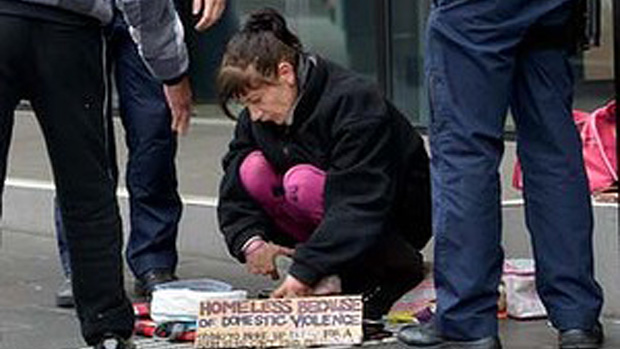Police are seizing coins and cash from beggars in Melbourne’s CBD as proceeds of crime, according to reports from homeless people and welfare workers.
Youth Projects say they have had up to eight cases in the past year of police confiscating the “meagre proceeds” of the homeless after they were charged with the offence of begging alms.
The welfare group’s chair, Melanie Raymond, said in one case, on Christmas Eve, a man was forced to put his takings in a charity box.
“We think begging should be decriminalised because it’s penalising people for being poor and hungry,” Ms Raymond said.
City worker Philip Staindl said last month a homeless man who begs near his office on Little Collins Street had $20 from his coffee cup taken.
He said the man was told that he was breaking the law, could be taken to court, and that his morning’s takings were the “proceeds of crime”. “I was incredulous,” Mr Staindl said.
A man, 33, begging on Elizabeth Street on Tuesday, said he had been charged with begging alms four times, but they let him keep his money. He said others have had their cash confiscated.
The last time the former heroin user was charged was two months ago, but yesterday he was back begging with his upturned beanie.
“I got sick of going to jail. Instead of stealing to get somewhere to stay I do this, which doesn’t hurt anyone,” he said.
Police on the beat on Tuesday confirmed they enforced begging laws and said while they can seize their cash as proceeds of crime, “we don’t do it”.
Meanwhile homeless people said those beggars who were targeted by police were mostly those who harassed the public, by yelling out to them and approaching them.
Victoria Police spokeswoman Sergeant Sharon Darcy also said she was not aware of any cases of cash seizures occurring.
More than 200 people were charged with begging alms last year, an offence that carries a maximum penalty of 12 months imprisonment. However, most who are charged in Melbourne are diverted to a program run by police, council and the Salvation Army.
The program, which puts the homeless in contact with welfare workers, was launched early last year over concern around “professional” and “aggressive” beggars were menacing people for cash.
Yet Lucy Adams, the manager and principal lawyer at Homeless Law, said those beggars netted in the crackdown were not the so-called professional beggars, but those experiencing “extreme hardship”.
Almost 80 per cent of their 14 clients involved in the program were long-term unemployed. All but one person had mental health problems.
“The vast majority were begging passively, just with a sign and sitting on the streets,” she said.
“We’ve got a complex social problem, we don’t know what else to do and our first response is law enforcement.”







